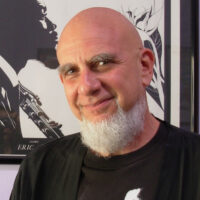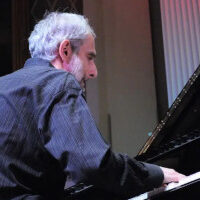

Among the many souvenirs of his half century as a music producer, manager, writer and activist, Marty Khan also has a collection of sculptures carved in ebony by the Makonde people of Tanzania, among them, one that resembled both Rodin’s “The Thinker” and his longtime friend and client Makanda Ken McIntyre. One bright and sunny day in June 2001, Khan picked up the phone to call McIntyre, when he heard a rumble in the mountains near his Tucson home. “It was this really deep rumble like thunder,” Khan remembered. “All of a sudden, a wind picks up that sculpture and smashes it on the floor, and the head breaks off. A half hour later we get a call from [producer] Steve Rowland, his brother-in-law, to tell us that Makanda just passed.”
It was a characteristic move for McIntyre, the composer and instrumentalist who shunned the spotlight but still projected his formidable intellect and influence on the jazz seen as an educator and mentor. Yet like the thunder in the Arizona mountains, McIntyre’s presence continues to be felt, as it will be in Cleveland Thursday when the 13-piece Makanda Project big band roars into Bop Stop playing a book of his unpublished compositions.

Because his name may not be familiar even to dedicated fans of improvised music in the Black American tradition, an introduction may be in order. Ken McIntyre was born in Boston to Jamaican immigrant parents in 1931. A late bloomer inspired by Charlie Parker, McIntyre started playing alto saxophone at 19. After two years of Army service, his skill grew so quickly that he received a masters’ degree in composition from the Boston Conservatory in 1959. One year later, he made his recording debut on an album co-led with the reedist Eric Dolphy, another multi-woodwind virtuoso with an outward bound sensibility.
Recordings are often the standard by which jazz careers are made and measured, and McIntyre’s relatively thin discography–just ten leader dates over the subsequent 40 years–helps to explain his undeserved public obscurity. Yet his stature as a teacher was well known, most notably through his 24-year career at SUNY-Old Westbury. There he founded and chaired the American Music, Dance and Theatre program, one of the first such departments in the country (the name Makanda, which he adopted in the early 1990s, means “head” in the language of the Zimbabwean Shona Empire according to Khan).
One of McIntyre’s students was pianist John Kordalewski, who remembers his teacher as stern but warmhearted. “He was a larger-than-life personality,” Kordalewski said via Zoom from Boston. “There was something very powerful about the way he communicated as a teacher He always said: Think of things in terms of both/and instead of either/or.”

Kordalewski and the saxophonist Kurtis Rivers would often get together to play some of the 75 or so tunes that McIntyre published. Then he learned from McIntyre’s widow that Khan had found about 350 hitherto unpublished scores in the composer’s papers. In 2005, Kordalewski assembled some of Boston’s best freelance players to bring this music to life. Those rehearsal sessions became The Makanda Project.
The lack of a performance history for the music was both obstacle and opportunity. “We’re not like a Jazz Messengers tribute band playing ‘Moanin” and ‘One By One,'” Kordalewski said. “What we’ve done with [these compositions] are our sound. It’s not like we’re evoking Makanda’s sound other than the fact that if you knew him, you hear him in the compositions. They are challenging and very rewarding to play.”
And full of unexpected lyricism. “There could be simple melodies, but sometimes his melodic lines have these kinds of rich twists and turns,” Kordalewski said. “But he’s able to do that, and have it be lyrical.”
Kordalewski concurs. “He knew how good he was, and, and knew that he wasn’t being recognized accordingly. So I think just the fact that we’re playing his pieces would mean a lot to him.”
The Makanda Project Thursday, April 21, 7 p.m. at Bop Stop, 2920 Detroit Ave., Cleveland. In-person $15 available here. The concert will be livestreamed at Bop Stop’s Facebook page. Viewing the stream is free but donations to the band and the venue are appreciated and can be made here.
